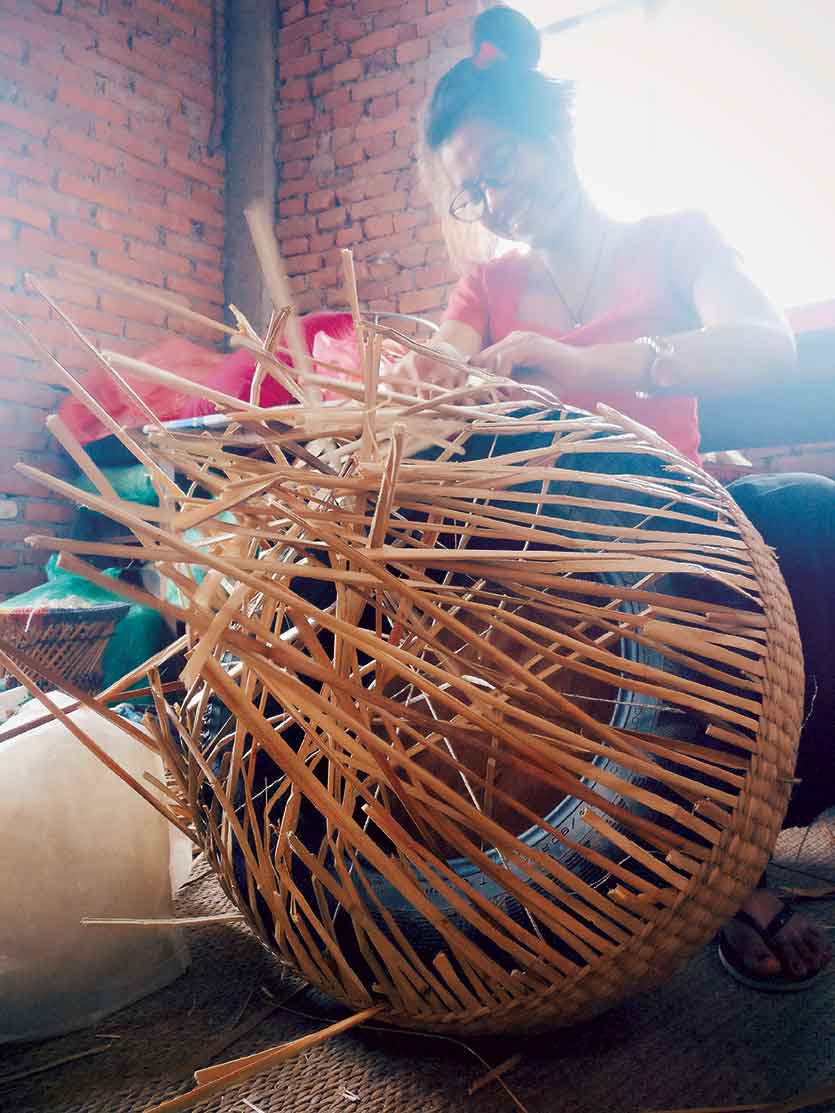
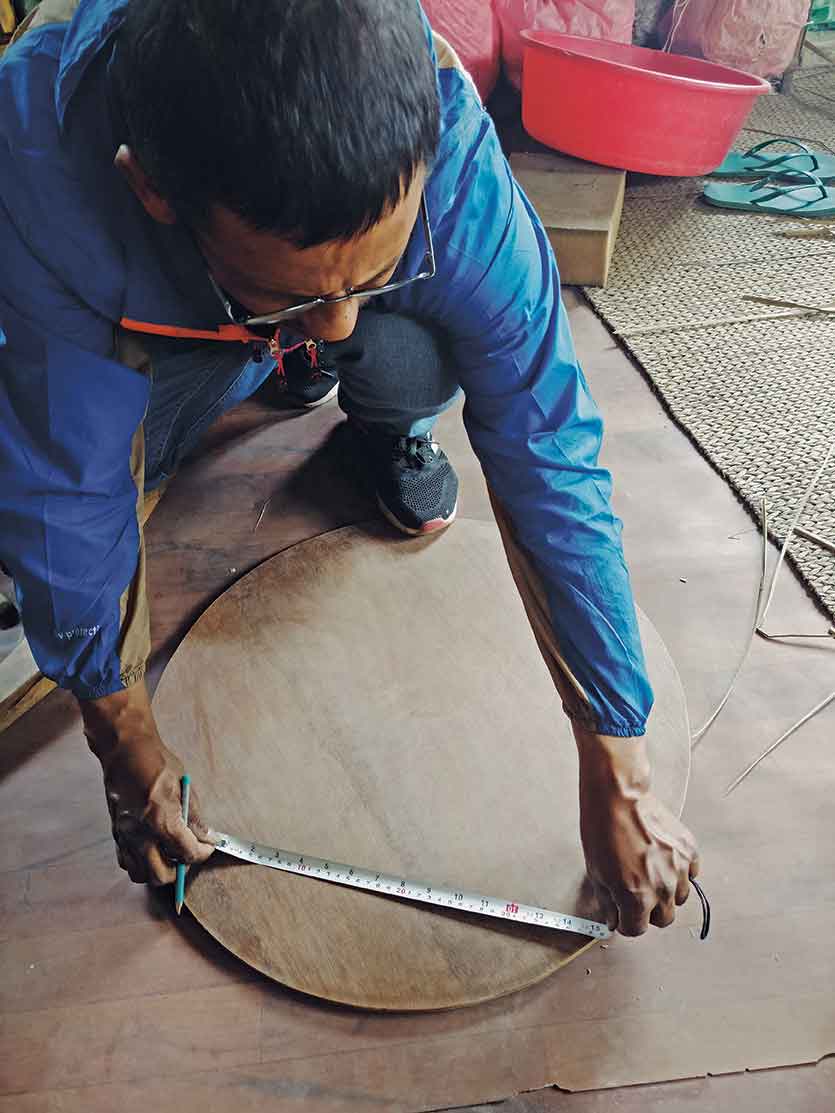
While many in Kathmandu are working on recycling plastics and paper, tyres have rarely been mentioned. That is, until Ojaswi Baidya and Loonibha Manandhar won a grant via the Greenovation Start-Up Challenge in 2016, a competition organised by WWF and The Nepal Entrepreneur Hub. This money enabled them to thoroughly research different environmental markets and then found Tyre Treasures, a pioneering company within the relatively untouched niche of upcycling otherwise wasted tyres.
The mentality behind the business is simple: back in 2016 when they launched, they learned that old tyres were being thrown into the Bagmati River, or sold to brick kilns where they were used as fuel, releasing all kinds of polluting gases and carcinogens. It was this waste problem which led Ojaswi and Loonibha to realise that old tyres could in fact be collected and upcycled to create furniture, a product with a much longer life than most.
Every now and then, the small team at Tyre Treasures head out around Kathmandu, collecting used tyres in bulk. Those who choose to donate their tyres for free are listed as green partners on the Tyre Treasures website, essentially forming a list of eco-aware auto-mechanics who take their corporate social responsibility very seriously. “Originally, we were scavenging the river banks for tyres, but eventually people stopped throwing them in which was good. We spoke to auto-workshops and collected their used tyres. Many were already selling them to brick kilns, so it was difficult, but then they began to sell and donate to us because they knew it was green and better for the environment,” Ojaswi explained.
The team at Tyre Treasures then cleans and processes the tyres in a production chain that’s as environmentally friendly as possible. For all indoor furniture, the company make sure to use organic thread, meaning no synthetic fibres are used which would defeat the purpose of the whole company, one with a fundamental environmental aim. They also use organic dye to decorate the ropes some products use and they’ve even managed to upcycle some of their own waste too, creating plant pots from their used spray-paint bottles.
Their signature SarJayanthi even incorporates waste plastics, which makes the material more flexible, enabling a traditional weaving process to be carried out over the spherical shape of a tyre.One of the things I absolutely loved when visiting Tyre Treasures was how small the company was. With just five main people in their core team, it’s easy to see how passionate they all are about the products they produce.
Through their work, they are also able to support around 25-35 crafters at Women’s Group Nepal and Nepal Nature Craft, as well as an independent wood worker. Ojaswi told me that while you can buy some of their products at Everything Nepali and via Daraz too, most people like coming down to the office where they can actually look at a range of products all laid out in one place and meet the girls themselves.
It is this small scale which makes customisation an option for customers at Tyre Treasures. Ojaswi told me, “Sometimes a customer wants one of the products, but they want it just a little bit different, so we customise accordingly for them. Maybe for their garden or lobby they want a chair with legs of a certain length, or cafes want a certain colour or style, so we make everything to order.”
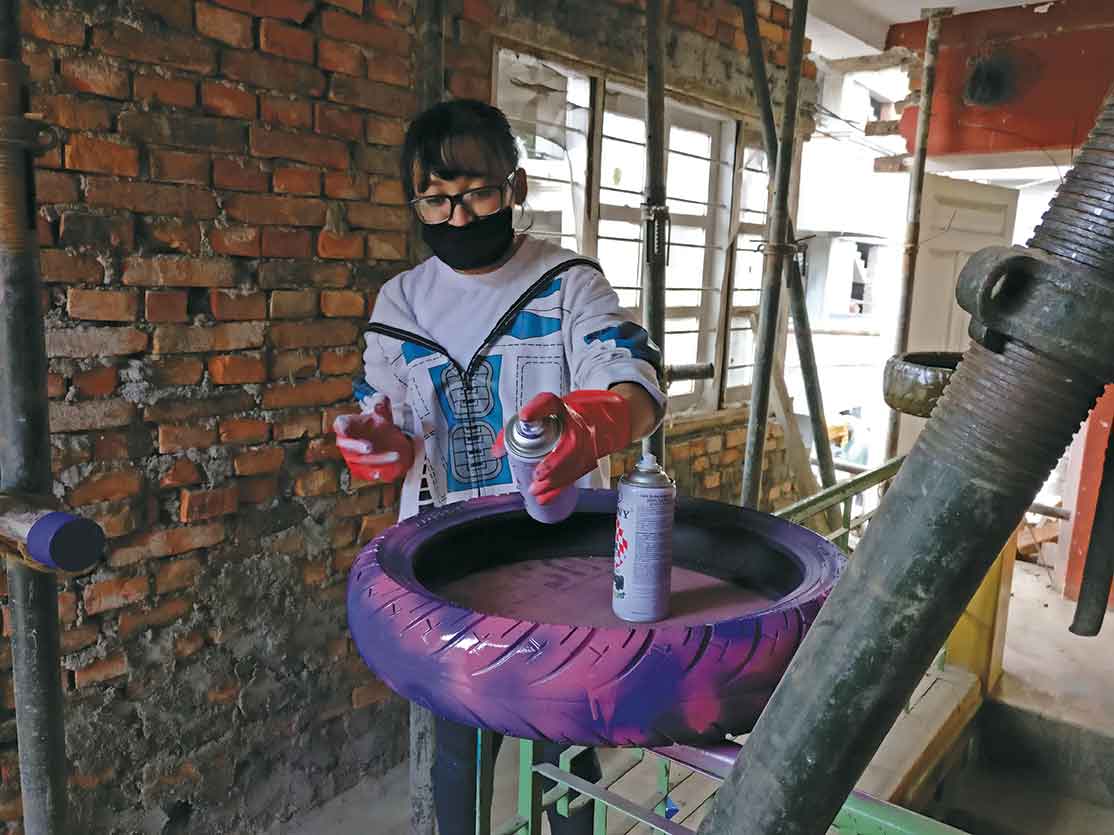
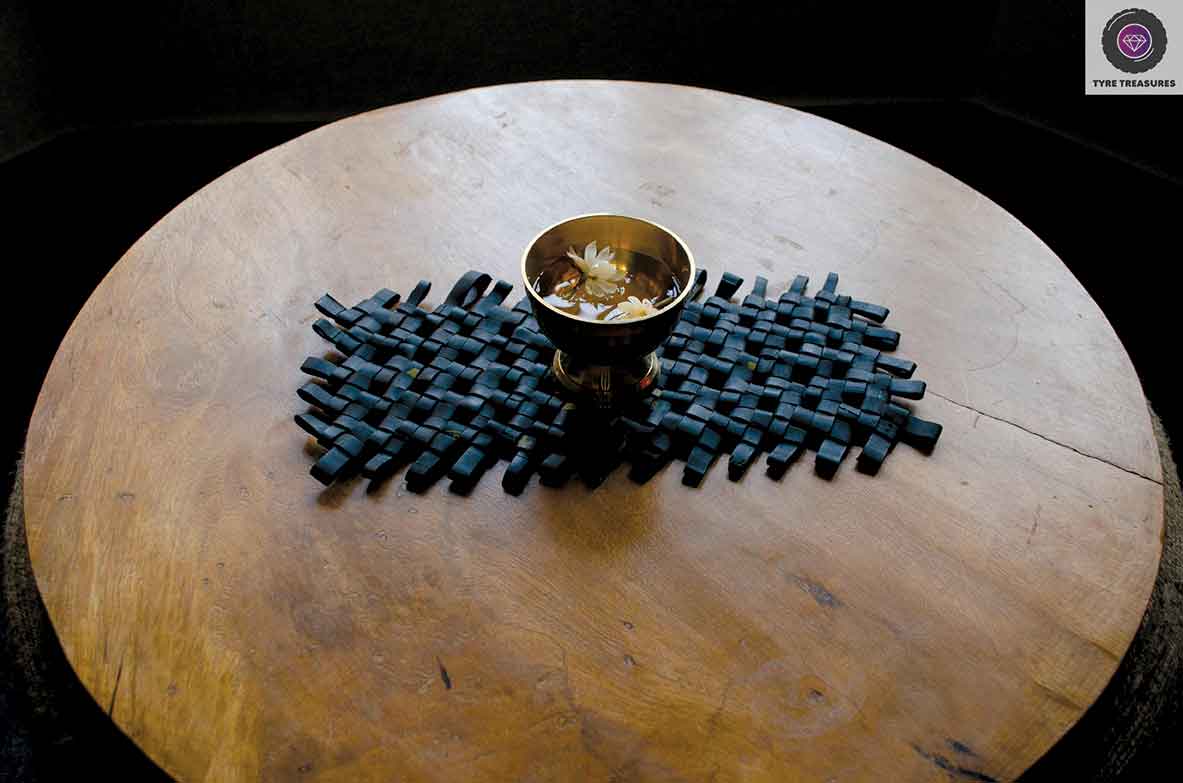
Just by browsing through some of the designs on Tyre Treasure’s Instagram account, it’s clear to see how unique and varied the different products are. Mass produced goods are thankfully going out of style, as people embrace traditionally made products. When talking to Ojaswi, she told me that she loves designing things and is really particular, meaning that each product passes the scrutiny of the company’s co-founder herself – a luxury you simply don’t get elsewhere in the furniture industry!
Although most individual pieces are customised, Tyre treasures produces around seven main product types which can be ordered via their website. One of their most popular products is the Dhukuti, which Ojaswi jokingly told me is one of the only products she has been able to make herself, proving she’s not entirely useless at crafts! The Dhukuti table is more than first meets the eye, as it doubles up as not just a table, but a storage unit too, making the most of small spaces in the house. It is this practical use which led to the name dhukuti, meaning a home storage space in Nepali.
Another one of their really popular products is their Full Circle Table, which comes in indoor and outdoor versions.
A stunning centrepiece, their outside edition comes with detachable cushions made from recycled, locally sourced cotton, fabric and silk. Equally appealing, their inside version is polished to create an edgy and rustic look and they have several varieties available for all types of home décor.
Named after two of the company’s amazing craftswomen, Sarita and Jayanti, Tyre Treasures also produce a table set they’ve named SarJayanthi. Intricately crafted using recycled plastic to give flexibility, it consists mainly of pater, a kind of water grass that’s widespread in the Terai. Local Tharu women cut and sort the pater so that the strength of the organic material is kept, and then crafters weave it around the tyre to create a very unique product. The process is then repeated to create both tables using bigger tyres and mudas using smaller ones.
Alongside traditional furniture items, they’ve also created a variety of dog baskets, spray painted in vibrant colours. The basket’s comfy cushion is made from scrap cotton and the cushion cover from locally produced fabrics and flexes via their partnership with Metta ktm, a company which upcycles flex banners into bags.
Expanding slightly out from furniture, Ojaswi and her team have also created a range of decorative items. The most interesting is their Tiki Jhya, an upcycled version of one of Nepal’s traditional crafts, made using tyre tubes instead. They are able to customise this piece in a variety of ways from framed pieces to giant room dividers – the beauty of a small company! When visiting their office, I was amazed at the remarkable similarity between their tyre-based upcycled product and its namesake, the wooden lattice window typical of Newari architecture and a piece of true ornate craftsmanship.
Another favourite is what they refer to as a ‘vertical garden,’ which is perfect for urban apartments and outside spaces – promoting all kinds of sustainable urban gardening.
It’s listed officially on their website as Treasure Garden, and it would certainly make an interesting piece of exterior design. The cheapest of all their products, Tyre Treasures have also expanded out to create breathtaking fairy light glass bottles, perfect for decorating outdoor spaces and rooms. While glass bottles can be efficiently recycled many times, they often are not and certain types (like colored ones) are not recycleable in Nepal, leaving them to be discarded in landfills and Kathmandu’s river banks. That’s why their product Twinkle Lights is a small, but incredibly useful product for reducing Kathmandu’s waste problem.
Despite these incredible products, Tyre Treasures finds itself in direct competition with the plastic market, with both pricing their goods around the mid-price point in the furniture industry. While plastic cracks and must be dumped after a few years, all products sold at Tyre Treasures come with a warranty and can be swapped or repaired if damage begins to show over time. Businesses like this are truly at the forefront of both the fufrniture and crafting industries of Kathmandu. Hopefully, over time, more people will begin to realise that green is the future.
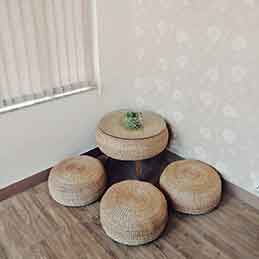
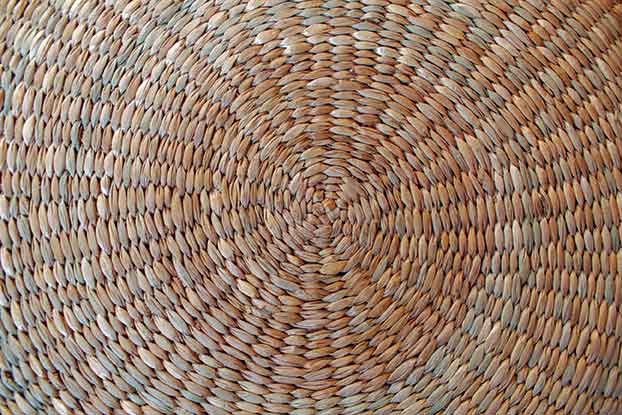
While there seems to be an emerging environmental market, it has not been easy sailing for the team here. As the products are essentially made from waste materials, some people think that they should be able to buy them for really cheap, and barter the prices to offensive levels that would make it impossible for the company to pay their crafters, let alone make any money. “When people understand what we do and appreciate our products, that’s what makes it worthwhile. We’ve also had some converts, people who were sceptical at first but now they get it and they’ve bought from us,” says Ojaswi.
In their 2019 audit, Tyre Treasures worked out that they managed to upcycle and sell over 500 tyres, reducing Kathmandu’s output of cancer-causing compounds by approximately 230,000 kg. In the upcoming year, they hope to triple this by upcycling around 1,500 tyres, a mega task which will help to reduce Kathmandu’s waste problem – one tyre at a time!
For more information and to buy products, head to the Tyre Treasure’s website at https://www.tyretreasures.com. Unique products can be seen on their Instagram at @tyre_treasures and on their Facebook, Tyre Treasures.










